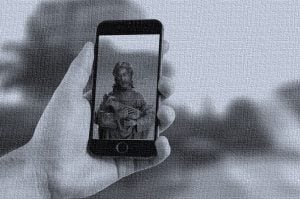
A headline in the Christian Science Monitor caught my attention: More public schools are embracing the Bible. Is it literature, or religion? The article is by Chelsea Sheasley and Patrik Jonsson.
Good. IMHO, study of the Bible should be included as an elective in public schools. I think the study of the Koran and the Vedas should be too, either in the same or separate courses. But the question, “Is it literature, or religion?” is unnecessarily binary and creates an insurmountable [false choice] impediment to a broader embrace, and denies willing students the opportunity to encounter the Bible. As if, first you must decide: is it literature or religion? And, as if, the Bible can only be encountered in places of worship. We are called to the public reading of scripture and where better than in the public school?
If you insist, I would answer it’s the literature of religion and religion is an integral part of the literature. The two are inseparable. The question shouldn’t be what the Bible is taught as, literature or religion, but rather how the Bible is taught.
It’s the politicizing of the question, and the disingenuous arguments put forth by some parties, that creates general mistrust. Allowing small groups to own and champion this for their own agendas, taught as the proselytizing of sectarian interests, creates poster children for abuse and spoils it for everyone.
Protecting the First Amendment
According to the article, a 2019 poll by PDK found that 58% of American adults surveyed thought Bible studies should be offered as an elective in public schools (77% of adults were open to offering comparative religion classes). The problem is we don’t know how to do this in a way that doesn’t “improperly promote Judeo-Christian religious beliefs.” But that is a solvable problem.
The establishment clause in the constitution must be respected. I’m getting way out over the tips of my skis here, but I would make a modest proposal:
- No LAW should be established, these courses/classes should be elective.
- The courses/class should not ESTABLISH any religion. Separate the Bible from any institution of the church. We are interested in the Bible, not any Book of Discipline or Catechism derived therefrom. You don’t have to join the Jane Austen Society or even a book club, to read Pride and Prejudice. You don’t have to be an atheist or conservative or attend a faculty or party meeting to read, understand or appreciate Origin of the Species or The Conservative Sensibility.
- Courses should not favor one religion over another.
- Courses should be offered on more than one such text if there is sufficient demand and someone qualified to teach,
- and favoring is easily solved by a comparative religion course (and that includes the “New Atheists.”)
Needless Rationalizing
I also think, arguments that the Bible has been so influential in terms of Western Culture that it must be taught are weak. It’s true, but the fact that it has been influential and is important to cultural literacy does not automatically lend it legitimacy. Especially, when this argument is really invoked as just a cover for a specific political or cultural agenda. There are many reasons and ways the Bible has been influential, not all of them positive from a human rights point of view. The Bible was influential in the burning of witches in Salem, but I hope we can all agree that was not a positive thing.
The Bible is worthy of study in and of itself, quite separate from its cultural and political history. I think it’s one thing to look at the cultural influences that the Bible has had and another to look at the confluence of cultural influences that collide in and infuse the Bible. The later is infinitely more engaging.
Experiencing the Bible
The Bible is a remarkable collection of documents. It is a text that may (and will likely) lead some to faith. But the wealth of human experience both good and bad, both temporal and transcendent that can be found in the Bible should not be the province or providence of only a select few and denied to all others. Gentiles did not mean only Greeks.
So, we need to find a way to teach it. And the study should not be dogmatically academic.
Of course, I think it should be read aloud; the way it was and is meant to be read. The public reading of scripture requires that it be read to the public. If the reading is intended only for Christians, then it’s a private reading.
Any class on Shakespeare that does not include the reading of Shakespeare aloud, is no class at all. The reading of Shakespeare is not intended only for Shakespeare scholars although they may lay claim to be the only ones who can truly understand him. I would say the same for the Bible. Although clergy, with a vested interest, may claim to be the only ones to understand the meaning, it is for all with ears to hear and all who are open to the experience.
I’m available to teach this course. How about you? All you need is the Bible.
Again, from the article: “It is about stepping outside of church and looking at the Bible in a different way,” she says. “It’s actually really fun.”

